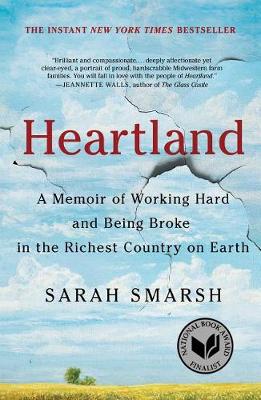Reviewed by Hillary on
What makes Heartland IMHO so much better than Hillbilly Psoriatic arthritis is that Sarah Smarsh takes a no holds barred approach to undercover why rational poverty occurs and how people survive when they are broke. No, this book is not set in the Appalachian Mountains but what she explains could very well be applied to the Appalachian area
The thing that stuck me as I was listening to the audio version is how people manage to dodge bills and all of that because they lack the funds to pay rent and stuff. For example; I know people who seem to change phone carriers and numbers at an alarming rate. I never really paid too much attention until I read in Heartland that poor people skirt around what they owe NOT BECAUSE THEY ARE LAZY but cause they are broke by going to a different service until they get cut off and so on. Lets say you have an iPhone with AT&T You found a deal on how to obtain a fancy phone and now you are proud but and this is the catch you can't really AFFORD the bill so when AT&T cuts you off you head over to Virizion until you run out of options then you get a track phone or an Obama Phone. I knew this. I have seen it time and time again. I was so used to it that I thought that was the norm. Never mind the fact that I have had the same number for ten years, and so have some of my college friends but yet I have a family member who I think has gone through every service twice a least and it makes my head hurt trying to keep up. This not only applies to cell phones but also houses and apartments. I have heard that as long as you stay one step ahead, you will never be truly homeless. When I was young and did not know any better, I used to get sooo jealous of people in my class in public school who moved into a different house every few months. I understand the WHY of it now.I also guess that there is nothing to be done. Makes me kinda sad to type this but as long as there is a vast gap in income inequality, there will always be broke people try to stay one step ahead.
Most shocking I finally realized how a person who is in extreme poverty could vote for a person like Trump. Sarah Smarsh uses her own family as an example. Sarah Smarsh's mother tells how she voted Republican not because she looked down on and hated the people in poverty but rather because it seemed like the right thing to do, From my experience, I know that people may not have a penny to their name but they pride themselves on having high morals. I have to be honest here, I never thought of that. When I found out that 99 percent of my family was voting for Trump, I almost blew a gasket. I was all like are you serious?!? I am guessing that the people must have had some blinders on if they failed to see how Trump "policies" would fuck everything up. But they did not, and my liberal self couldn't see past my assumptions of a population that never made it out of poverty to see and understand WHY someone would choose to vote against their own best interests.
This is perhaps the biggest lesson I gleaned from this book. An inside look at what Trump Supporters may think like. I can't really fault them for I am sure if I did backbreaking work and I STILL couldn't afford what i needed I too would try and find a Savior and a scapegoat. in this case, Trump and the hordes of immigrants according to Trump attempting to get in the USA.
On Goodreads, there were some complaints about using the voice of Sarah Smarsh's unborn daughter to drive home a point. I have mix feelings about this. I mean the way she describes it, as a separate entity spirit person almost veered into the creepy laboratory. One one hand I can SEE what the unborn daughter represented and at the end when she explains that was one soul that would never be born cause she wasn't broke and that soul was to be taken into a family that was struggling to meet the basic requirements for staying alive. I am also jealous that she had such a "spirt" to guide her. I had nothing. All I ever felt was the feeling of will this help me escape from this hellhole?
Looking back I can see that while I may not have had an unborn child, I DID have something that guided me so that I did escape the poverty cycle. Maybe it all serves the same purpose of having a spirit guide us to a better life in a nicer income bracket.
How do YOU fell about books such as Heartland and Hillbilly Elegy? Do you feel they shed a light on the issues or just make things worse?This review was originally posted on Adventures in Never Never Land
Reading updates
- Started reading
- 7 January, 2019: Finished reading
- 7 January, 2019: Reviewed
- Started reading
- Finished reading
- 7 January, 2019: Reviewed

